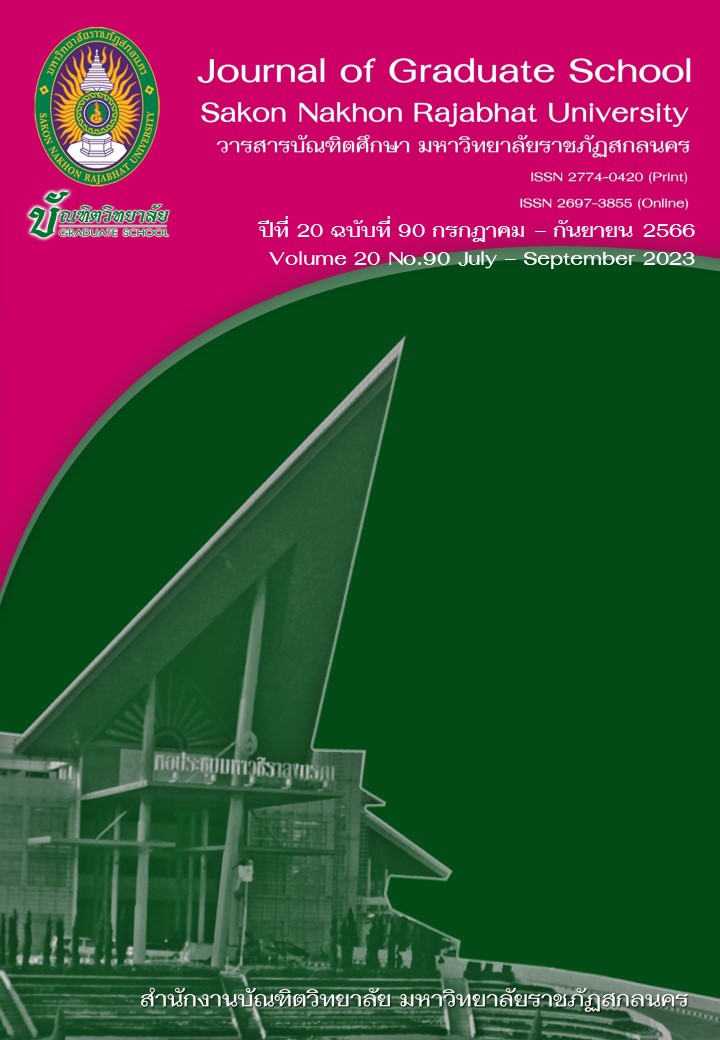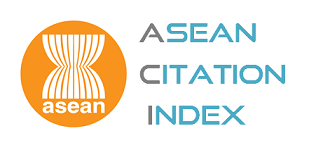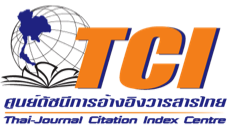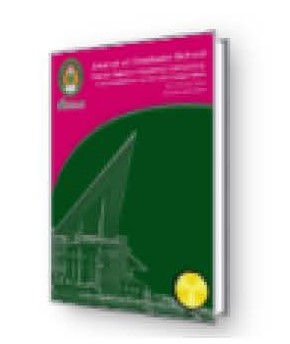ผลการจัดการเรียนรู้วิชาพฤติกรรมองค์การโดยใช้แนวคิดการเรียนรู้เพื่อการเปลี่ยนแปลงของนักศึกษา หลักสูตรศึกษาศาสตรมหาบัณฑิต สาขาวิชาการบริหารการศึกษา มหาวิทยาลัยสงขลานครินทร์ วิทยาเขตปัตตานี
Keywords:
Learning Management Effects, Organizational Behaviors, Transformational Learning, Educational AdministrationAbstract
This classroom action research aimed to study critical-type questions using case studies and examine the students’self-reflection diary on the organizational behavior subject in a master of education program in educational administration at Prince of Songkla University, Pattani Campus. The target group was 25 second-year students who enrolled in the organizational behavior subject during the first semester of the 2019 academic year in a master of education program in educational administration at Prince of Songkla University, Pattani Campus. The instrument included 15 lesson plans designed based on the transformative learning concept and the protocol checklist. The data was analyzed using content analysis.
The findings of the research were as followed: 1) the critical-type questions from the case studies in the organizational behavior subject in a master of education program in educational administration at Prince of Songkla University, Pattani Campus, were categorized into three attributes: (1) paradox questions, (2) organizational working process questions, and (3) value and spiritual questions; 2) the student's self-reflection diaries were classified into four groups: (1) disorienting dilemma, (2) exploration of new perspectives, (3) positive support, and (4) the oppressed.
References
กระทรวงการอุดมศึกษา วิทยาศาสตร์ วิจัยและนวัตกรรม. (2563). แผนปฏิบัติการ กระทรวงการอุดมศึกษา วิทยาศาสตร์ วิจัยและนวัตกรรม ประจำปีงบประมาณ พ.ศ. 2563. กรุงเทพฯ: สำนักนโยบายและยุทธศาสตร์ สำนักงานปลัดกระทรวงการอุดมศึกษา วิทยาศาสตร์ วิจัยและนวัตกรรม.
กิจการ พรหมมา และลลิตกร พรหมมา. (2559). อาจารย์มหาวิทยาลัย ชีวิต กลยุทธ์การทำผลงานทางวิชาการ และการขอตำแหน่งทางวิชาการ. (พิมพ์ครั้งที่ 2). กรุงเทพฯ: จุฬาลงกรณ์มหาวิทยาลัย.
โครงการวิจัยเชิงปฏิบัติการจิตตปัญญาศึกษา. (2552) กรุงเทพฯ: มหาวิทยาลัยมหิดล.
ชวลิต เกิดทิพย์. (2561). เอกสารคำสอนพฤติกรรมองค์การ. (พิมพ์ครั้งที่ 2). ปัตตานี: มหาวิทยาลัยสงขลานครินทร์ วิทยาเขตปัตตานี.
โรส ภักดีโต และจุไร อภัยจิรรัตน์ (2559). การเรียนรู้เพื่อการเปลี่ยนแปลงในการจัดประสบการณ์การเรียนรู้เรื่อการตัดสินใจเชิงจริยธรรมสำหรับนักศึกษาพยาบาล. วารสารพยาบาลสภาการชาดไทย, 9(1), 1–10.
วรรณดี สุทธินรากร. (2560). การเรียนรู้เพื่อการเปลี่ยนแปลง และการวิจัยเชิงปฏิบัติการ. กรุงเทพฯ: สยามปริทัศน์.
_______. (2561). การวิเคราะห์ข้อมูลในงานวิจัยเชิงคุณภาพ. กรุงเทพฯ: สยามปริทัศน์.
วอล์กเกอร์, ทิโมธี ดี. (2562). สอนฟิน เรียนสนุก สไตล์ฟินแลนด์. แปลจาก Teach like Finland. แปลโดย ทิพย์นภา หวนสุริยา. กรุงเทพฯ: บุ๊คสเคป.
ปรีชา นวลเป็นใย. (2561). ประชากรสูงวัยและแนวโน้มในอนาคต. วารสารข้าราชการ, 60(4), 3–5.
Ackoff, R.L. (2002). Planning in the Systems Age. The Indian Journal of Statistics, 35(2), 149-164.
Berger, W. (2014). A More Beautiful Question: The Power of Inquiry to Spark Breakthrough Ideas. NY: Bloomsbury.
Christie, M., Carey, M., Robertson, A., & Grainger, P. (2015). Putting transformative learning theory into practice. Australian Journal of Adult Learning, 55(1), 10-30.
Colagrossi, M. (2020). 10 reasons why Finland's education system is the best in the world. Retrieved from https://www.weforum.org/agenda/2018/09/10-reasons-why-finlands-education-system-is-the-best-in-the-world. September 18th, 2021.
Creswell, J. W., & Poth, C.N. (2017). Qualitative Inquiry and Research Design: Choosing Among Five Approaches. (4thed.). Thousand Oaks, CA: Sage Publications.
Howie, P. & Bagnall, R. (2013). A beautiful metaphor: Transformative learning theory. International Journal of Lifelong Education, 32(6), 816-836.
Mezirow, J. (2000a). Learning to think like and adult: Core concepts of transformative theory. In J. Mezirow & Associates (Eds.), Learning as transformative: Critical perspectives on a theory in progress (pp.3–33). San Francisco, CA: Jossey-Bass.
_______. (2000b). Learning as transformation: Critical perspective on theory in progress. San Francisco, CA: Jossey-Bass.
Morse, J. D., & Field, P. A. (1995). Qualitative research method for health professionals. (2nded.). Thousand Oaks, CA: Sage Publications.
Kitchenham, A. (2008). The evolution of John Mezirowûs transformative learning theory. Journal of Transformative Education. 6(2):104-23. Retrieved from: http://jtd.sagepub.com/content/6/2/104. June 7th, 2021.
O’Sullivan, E. (2003). Being a perspective of consumption. International journal of consumer studies, 27(4), 326–330.
Taylor, E. W. (2001). Transformative learning theory: a neurobiological perspective of the role of emotions and unconscious ways of knowing. Journal of Lifelong Education, 20(3), 218–236.
Downloads
Published
How to Cite
Issue
Section
License
Copyright (c) 2023 Journal of Graduate School Sakon Nakhon Rajabhat University

This work is licensed under a Creative Commons Attribution-NonCommercial-NoDerivatives 4.0 International License.
บทความทุกบทความที่ตีพิมพ์ในวารสารบัณฑิตศึกษา มหาวิทยาลัยราชภัฏสกลนคร ถือว่าเป็นลิขสิทธิ์ของบัณฑิตวิทยาลัย มหาวิทยาลัยราชภัฏสกลนคร










